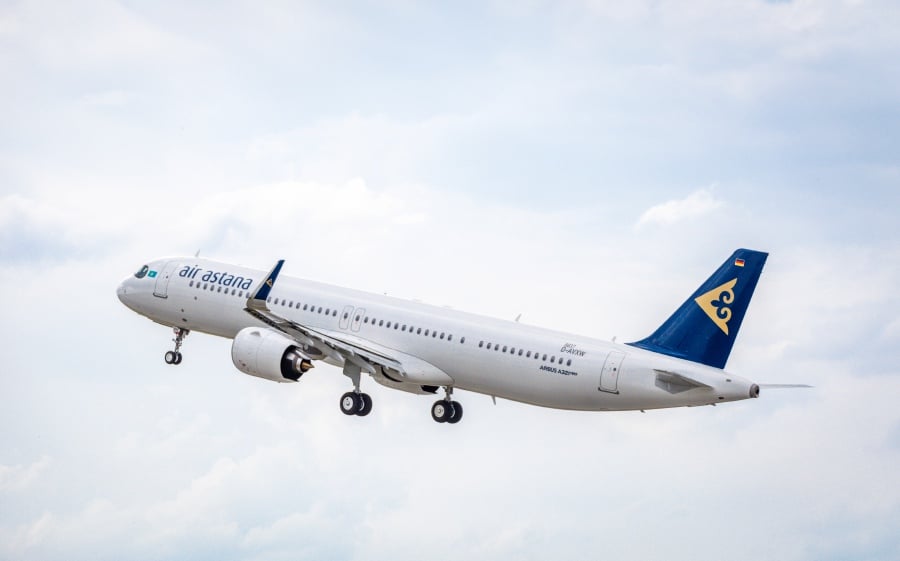ASTANA, KAZAKHSTAN: Air Astana, the leading airline in Central Asia, is planning to return to the capital of Malaysia with an onward service to Singapore from Almaty in October 2024.
Air Astana president and chief executive officer Peter Foster said the airline would operate its Airbus A321LR (long-range) aircraft on the Almaty-Kuala Lumpur-Singapore-Kuala Lumpur-Almaty flight with three times weekly frequency.
"I think we'll do well when we relaunch it. The links between Kazakhstan and Malaysia are traditionally strong…Kazakhs like to go to Malaysia for many reasons.
"We think we can attract more Malaysian travellers up here, not just in Kazakhstan but to the region - the Silk Road cities. We've got a very good network now to Uzbekistan for example and to Georgia, which is popular," Foster told the New Straits Times in an interview here recently.
Air Astana first introduced the Almaty-Kuala Lumpur flight in October 2009. However, the direct flight was stopped 11 years later in 2020.
According to Foster, the reasons included borders lockdown due to the Covid-19 pandemic as well as low yields on the particular route.
However, he said the yields to Southeast Asia now was much higher due to the strong air travel demand while at the same time it was much cheaper for Air Astana to operate the four-stage route with its new A321LR aircraft.
"We think demand for Kuala Lumpur is going to be good. It's cheaper for us to operate it (the route) now with the A321LR. Pre-pandemic, we didn't have those aircraft. It was expensive to operate the Boeing B757 (which was used to operate the Almaty-Kuala Lumpur route before the pandemic)," Foster said.
He said Air Astana was also looking at flying to Singapore and the best way for the airline was to twin the route with Kuala Lumpur to fly to and from Almaty.
Yield indicates the profitability of every single passenger that an airline carries by dividing the revenue of each passenger by each kilometre flown.
Foster said Air Astana was waiting for the delivery of its new airplanes before returning to Kuala Lumpur.
"We need more aircraft. We need more pilots. The entire industry is suffering from shortages in pretty much every area at the moment, whether it's aircraft, crews, engineers, etc. We don't have the aircraft to do it at the moment," he said.
Commenting on the competition that Malaysia's long-haul budget carrier, AirAsia X Bhd would bring if the airline enters the Kazakhstan market, he said Air Astana did not mind the competition as the Kazakhstan full-service carrier has its own product and efficient cost base.
"We'll have to wait and see how that develops… We have a very good product. We've got a very efficient cost base. We don't mind the competition. This is part of life," Foster, who has been leading Air Astana for nearly 20 years, said.
He added that there were no plans for Air Astana's wholly-owned budget carrier, FlyArystan to introduce Kuala Lumpur or any flights that are over four and a half hours from Kazakhstan as the carrier operates the Airbus A320 aircraft.
"At the moment for FlyArystan, we've imposed a sort of internal restrictions. I know other people have different beliefs but we believe that the low-cost airline model doesn't really work for anything more than four and a half hours," he said.
Air Astana, which started commercial flights in May 2002, is a joint venture between Kazakhstan's sovereign wealth fund, Samruk Kazyna (51 per cent) and BAE Systems PLC (49 per cent).
Currently, Air Astana Group (which includes Air Astana and FlyArystan) has 43 aircraft in its fleet which comprises of 10 Airbus A320neo (new engine option), nine A320, four A321neo, two A321, 10 A321LR, three B767 and five Embraer E190-E2.
Since the beginning of 2022, the group has received eight new aircraft with seven more scheduled for delivery by end-2023. The aircraft comprises of A320s and A321s.
Air Astana is also planning to launch its US$10.4 million new pilot training centre in Astana by July this year to train 500 of its own pilots.
Peter said the new training facility, which currently has one flight simulator, would help reduce cost for the Air Astana group airlines while increasing the productivity of their pilots.
He said a second simulator would be added in the future where it could be used by third-party airlines for pilot training.





